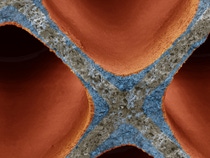Media
BASF and Citrine Informatics collaborate to use artificial intelligence to develop new catalyst technology
ISELIN, NJ, and SAN FRANCISCO, CA, June 21, 2018 – BASF and Citrine Informatics are collaborating to use artificial intelligence (AI) to accelerate the development of new environmental catalyst technologies. Citrine Informatics is a next-generation platform that harnesses the power of AI to bring new materials to market faster, and capture materials-enabled product value.
With the global need to enable clean air for a sustainable future, customers worldwide are looking for innovative, cost-effective solutions to meet evolving emission regulations. The key to success is matching product performance with speed-to-market. BASF and Citrine are collaborating to accelerate innovation by implementing machine learning for research. The preliminary phase of the pilot project focuses on identifying new materials for capturing greenhouse gases, like carbon dioxide (CO2). In the collaboration, BASF is providing experimental data to build proprietary AI models using the Citrine platform. By iteratively testing newly suggested materials from the models in the lab, BASF and Citrine aim to improve the models through sequential learning by retraining the algorithms with new data.
“We strongly believe that combining our technical knowledge and experimental data with AI can accelerate material discovery,” said Dr. Mengting Yu, who leads digitalization initiatives in heterogeneous catalysis at BASF. “The model rapidly screened thousands of new materials and became smarter in its predictions. We are looking forward to extending our collaborations into other catalysis applications.”
“AI is a critical technology in BASF’s digitalization roadmap, and for R&D it dramatically changes how our scientists design experiments or value data,” said Victor Oh, Digital Innovation, BASF based in San Francisco. “Our work with Citrine has given us many new insights and will serve as a key benchmark in our continued exploration for other AI opportunities globally.”
The future of materials development depends on speed. Developing materials faster will require managing and using data more effectively, which includes consolidating data into a single consistent searchable format, as well as structuring, storing, and using materials data to harness the power of AI.
“AI-driven materials development is the future of the materials industry and we are pleased with the BASF catalyst results,” said Greg Mulholland, CEO of Citrine Informatics. “The companies who are first to invest in this technology will reap tremendous market rewards.”
For a press photo, please click on the following link:
https://www.basf.com/press-photos/us/en/photos/2018/06/06-21-18_BASFcatalyst.jpg
Suggested Caption: BASF and Citrine Informatics are collaborating to use artifical intelligence to speed the development of environmental catalyst technology, such as the catalyst shown in this microscopy image.
About BASF’s Catalysts Division
BASF’s Catalysts division is the world’s leading supplier of environmental and process catalysts. The group offers exceptional expertise in the development of technologies that protect the air we breathe, produce the fuels that power our world and ensure efficient production of a wide variety of chemicals, plastics and other products, including advanced battery materials. By leveraging our industry-leading R&D platforms, passion for innovation and deep knowledge of precious and base metals, BASF’s Catalysts division develops unique, proprietary solutions that drive customer success. Further information on BASF’s Catalysts division is available on the Internet at www.catalysts.basf.com.
About BASF
BASF Corporation, headquartered in Florham Park, New Jersey, is the North American affiliate of BASF SE, Ludwigshafen, Germany. BASF has more than 18,200 employees in North America, and had sales of $17.9 billion in 2017. For more information about BASF’s North American operations, visit www.basf.com.
At BASF, we create chemistry for a sustainable future. We combine economic success with environmental protection and social responsibility. The more than 115,000 employees in the BASF Group work on contributing to the success of our customers in nearly all sectors and almost every country in the world. Our portfolio is organized into five segments: Chemicals, Performance Products, Functional Materials & Solutions, Agricultural Solutions and Oil & Gas. BASF generated sales of €64.5 billion in 2017. BASF shares are traded on the stock exchanges in Frankfurt (BAS), London (BFA) and Zurich (BAS). Further information at www.basf.com.
About Citrine Informatics
Citrine Informatics is the leading materials informatics platform. Our technology accelerates the development of materials and chemicals using the power of materials data and AI. Citrine is backed by leading investors including Tencent Holdings, B&C Holdings, Innovation Endeavors, DCVC (Data Collective), Prelude Ventures, AME Cloud, XSeed Capital, Morado Ventures, and Ulu Ventures. The company is headquartered in Redwood City, CA. Follow us at @Citrine_io.
P-US-18-075
